代词难点一点通概要
第03讲 代词(讲义)(解析版)
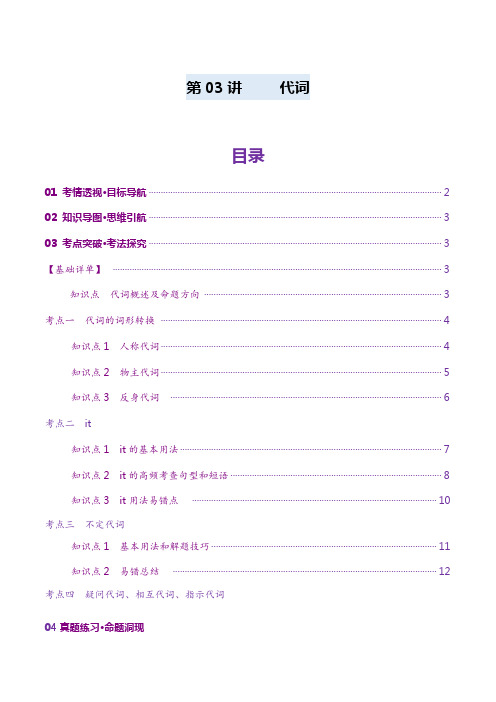
1.宾格形式:在句中作宾语或表语。
2.物主代词:形容词性物主代词在名词前作定语。名词性物主代词作主语、宾语或表语。
3.反身代词。
无提示词:
1.it替代真正的主语或宾语
2.some, any, another, both,one等不定代词。
注意:解题时要仔细观察复杂语境中代词所充当的真正句子分成。
some-, any-, no-等+thing, +body的合成代词
many, much, (a) few, (a) little,这里注意所修饰的名词的单复数。
the other, another,t hat, those,the others, others, one, ones注意指代(2024年浙江1月高考考查ones )
名师提醒:1.作主语:人称代词主格(I、we、you等)。2.作宾语/表语:人称代词宾格(me、us、you等)、名词性物主代词(mine、ours、yours等)。
知识点
形容词性物主代词
my
our
your (你的)
your (你们的)
his
her
its
their
名词性物主代词
mine
ours
yours
动词短语:behave oneself, dress oneself, enjoy oneself, express oneself;
介词短语:by oneself, for oneself, in oneself, to oneself,这些固定搭配应该重点记忆。
不定代词
all, both, either, none, neither, each, any,这里要注意并列连词的使用,它也是解题的关键。
高考代词要点难点讲解
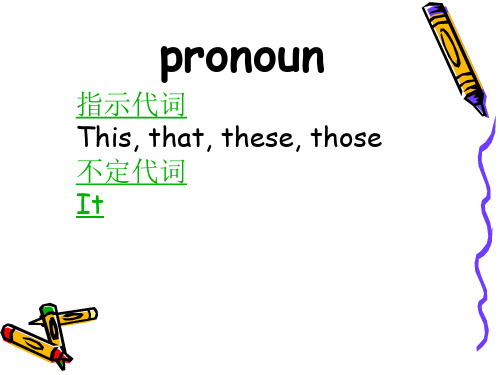
Practice
John wore his best suit to the party last night. a. John (subject) It was John who/that wore his best suit to the party last night. b. Best suit (object) It was his best suit that John woDon’t mention it. 2. It’s my pleasure.
3.Take it easy.
4. It’s up to you. 5.It all depends. 6.Forget it. 7. It doesn’t matter. 8.Believe it or not.
pronoun
指示代词 This, that, these, those 不定代词 It
有时that和those指前面讲到过的事 物,this 和these则是指下面将要 讲到的事物. I had a cold. That's why I didn't come. What I want to say is this ; pronunciation is very important in learning English.
the party. c. Last night (adverbial) It was last night that John wore his best suit to the party
John went to the party after work with his friends.
d. after work (adverbial) It was after work that John went to the
高三英语代词考点与难点共26页文档

36、自己的鞋子,自己知道紧在哪里。——西班牙
37、我们唯一不会改正的缺点是软弱。——拉罗什福科
xiexie! 38、我这个人走得很慢,但是我从不后退。——亚伯拉罕·林肯
Hale Waihona Puke 39、勿问成功的秘诀为何,且尽全力做你应该做的事吧。——美华纳
40、学而不思则罔,思而不学则殆。——孔子
高三英语代词考点与难点
56、死去何所道,托体同山阿。 57、春秋多佳日,登高赋新诗。 58、种豆南山下,草盛豆苗稀。晨兴 理荒秽 ,带月 荷锄归 。道狭 草木长 ,夕露 沾我衣 。衣沾 不足惜 ,但使 愿无违 。 59、相见无杂言,但道桑麻长。 60、迢迢新秋夕,亭亭月将圆。
谢谢!
高考代词重难点
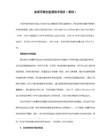
—Yes,I think.(think 后应接分句替代词 so,否则意思不明)
C. —Are you going to watch the game?
—I'm sure so,for it promises to be a close one.(应将 so 改为I will,因为 be sure后不能接分句替代词。)
A.that B.you C.this D.it
解析:答案D; 语意:先生,你是开车去机场吗?如果你能载我一程,我将非常感激。根据语意可知,it为形式宾语,代替真正的宾语if you could give me a lift。
2. it 在强调句型中
要强调句子的某一部分(通常是主语,状语,宾语),这种句子的结构是 “It is(was)+被强调部分+that (who )+句子的其余部分” .如果强调的部分是人,可用who whom 代替that。
特别提醒:如果替代的是前面的“动词+状语”结构,一般用 do so 或 do,而不能用 do it。后者主要替代“动词+宾语”的结构。
3.分句性替代——分句替代词 so 和 not 的用法【高考考点】
so 和 not 常接在某些语气较为委婉的动词之后,以替代 that 从句。这样的动词有:believe,think,hope,expect,suppose,imagine,say,hear,guess,be afraid 等。
另外,so 和 not 还可以用在if后面,以避免重复前文。例如:
—Are you free this evening? If so,come and join us in the dance.(不说 If you are free...)
【初中英语】 代词难点汇总精品资料
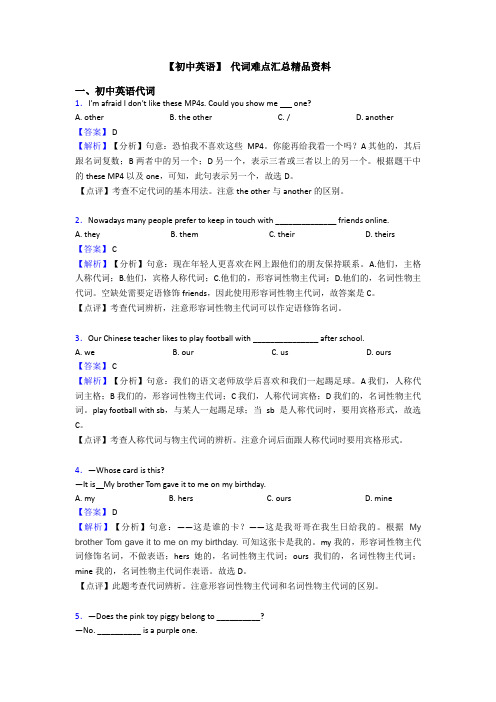
【初中英语】代词难点汇总精品资料一、初中英语代词1.I'm afraid I don't like these MP4s. Could you show me one?A. otherB. the otherC. /D. another【答案】 D【解析】【分析】句意:恐怕我不喜欢这些MP4。
你能再给我看一个吗?A 其他的,其后跟名词复数;B 两者中的另一个;D 另一个,表示三者或三者以上的另一个。
根据题干中的these MP4以及one,可知,此句表示另一个,故选D。
【点评】考查不定代词的基本用法。
注意the other与another的区别。
2.Nowadays many people prefer to keep in touch with ______________ friends online. A. they B. them C. their D. theirs【答案】 C【解析】【分析】句意:现在年轻人更喜欢在网上跟他们的朋友保持联系。
A.他们,主格人称代词;B.他们,宾格人称代词;C.他们的,形容词性物主代词;D.他们的,名词性物主代词。
空缺处需要定语修饰friends,因此使用形容词性物主代词,故答案是C。
【点评】考查代词辨析,注意形容词性物主代词可以作定语修饰名词。
3.Our Chinese teacher likes to play football with _______________ after school.A. weB. ourC. usD. ours【答案】 C【解析】【分析】句意:我们的语文老师放学后喜欢和我们一起踢足球。
A 我们,人称代词主格;B 我们的,形容词性物主代词;C 我们,人称代词宾格;D 我们的,名词性物主代词。
play football with sb,与某人一起踢足球;当sb是人称代词时,要用宾格形式,故选C。
【点评】考查人称代词与物主代词的辨析。
超实用高考英语重难点专题复习:代词(精讲课件)

类别
人称代词
物主代词
反身代词
主格
宾格
形容词性
名词性
功能
主语
宾语、表语
定语
主语、表语、宾语
宾语、表语、同位语
第一人称
单数
I
me
my
mine
myself
复数
we
us
our
ours
ourselves
第二人称
单数
you
your
yours
yourself
复数
yourselves
第三人称
单数
he
him
his
himself
she
her
her
hers
herself
it
it
its
itstheir
theirs
themselves
一、人称代词、物主代词、反身代词、指示代词及疑问代词
2. 反身代词的搭配
say to oneself 心里想dress oneself 自己穿衣seat oneself 坐下enjoy oneself 玩得开心teach oneself 自学help oneself to 随便吃;随便用
二、it的用法
1. it的指代用法(4)指代时间、距离、天气、气候、环境或温度。例:It is nine o'clock sharp now.现在是九点整。It is raining hard outside. 外面雨下的正大。It is a long way to the factory.到工厂有很长一段路。It's very noisy in the room.屋里噪音很大。
代词难点,疑点讲解
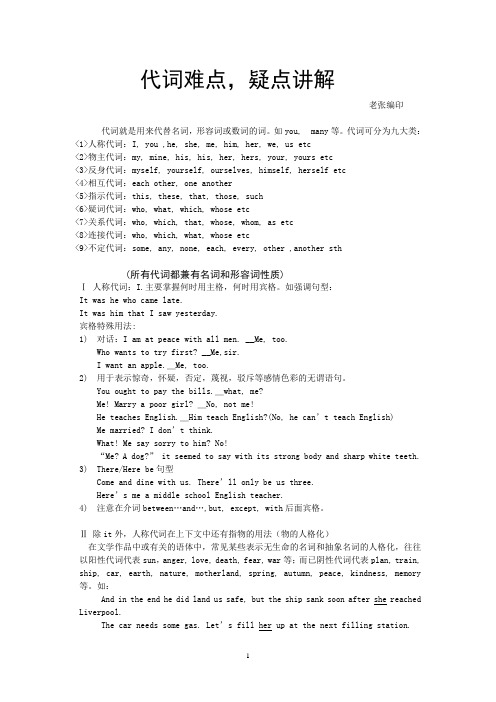
代词难点,疑点讲解老张编印代词就是用来代替名词,形容词或数词的词。
如you, many等。
代词可分为九大类:<1>人称代词:I, you ,he, she, me, him, her, we, us etc<2>物主代词:my, mine, his, his, her, hers, your, yours etc<3>反身代词:myself, yourself, ourselves, himself, herself etc<4>相互代词:each other, one another<5>指示代词:this, these, that, those, such<6>疑词代词:who, what, which, whose etc<7>关系代词:who, which, that, whose, whom, as etc<8>连接代词:who, which, what, whose etc<9>不定代词:some, any, none, each, every, other ,another sth(所有代词都兼有名词和形容词性质)Ⅰ人称代词:I.主要掌握何时用主格,何时用宾格。
如强调句型:It was he who came late.It was him that I saw yesterday.宾格特殊用法:1)对话:I am at peace with all men. __Me, too.Who wants to try first? __Me,sir.I want an apple._Me, too.2)用于表示惊奇,怀疑,否定,蔑视,驳斥等感情色彩的无谓语句。
You ought to pay the bills._what, me?Me! Marry a poor girl? _No, not me!He teaches English._Him teach English?(No, he can’t teach English)Me married? I don’t think.What! Me say sorry to him? No!“Me? A dog?” it seemed to say with its strong body and sharp white teeth.3)There/Here be句型Come and dine with us. There’ll only be us three.Here’s me a middle school English teacher.4)注意在介词between…and…,but, except, with后面宾格。
语法填空代词解题技巧
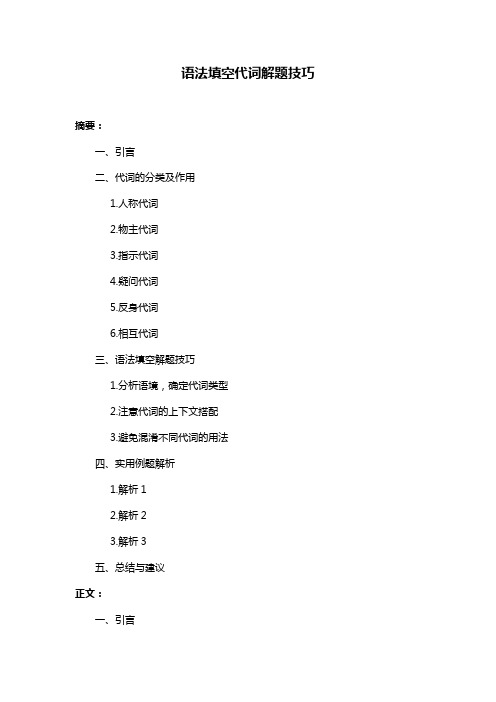
语法填空代词解题技巧摘要:一、引言二、代词的分类及作用1.人称代词2.物主代词3.指示代词4.疑问代词5.反身代词6.相互代词三、语法填空解题技巧1.分析语境,确定代词类型2.注意代词的上下文搭配3.避免混淆不同代词的用法四、实用例题解析1.解析12.解析23.解析3五、总结与建议正文:一、引言作为一名学生,我们在英语学习中会遇到各种语法题型,其中语法填空题是一个重要的组成部分。
在这类题型中,代词的填空往往让我们感到困惑。
今天,我们就来探讨一下语法填空中的代词解题技巧,帮助大家更好地应对这类题目。
二、代词的分类及作用1.人称代词:代人,例如:I(我),you(你),he(他),she(她),we (我们),they(他们/她们)。
2.物主代词:表示某人的某物,例如:my(我的),your(你的),his (他的),her(她的),our(我们的),their(他们的/她们的)。
3.指示代词:表示距离说话人较近的人或物,例如:this(这个),that (那个),these(这些),those(那些)。
4.疑问代词:用于提问,例如:who(谁),what(什么),which(哪一个),whose(谁的)。
5.反身代词:表示某人自己,例如:myself(我自己),yourself(你自己),himself(他自己),herself(她自己),ourselves(我们自己),themselves(他们/她们自己)。
6.相互代词:表示彼此,例如:each other(彼此),one another(彼此)。
三、语法填空解题技巧1.分析语境,确定代词类型。
在做题时,首先要仔细阅读题目,理解语境,根据语境判断需要填入的代词类型。
2.注意代词的上下文搭配。
在填空时,要注意上下文之间的关系,确保填入的代词与句子其他部分搭配正确。
3.避免混淆不同代词的用法。
不同类型的代词在用法上有所区别,要避免在填空过程中混淆它们的用法。
代词难点、易错点(1)
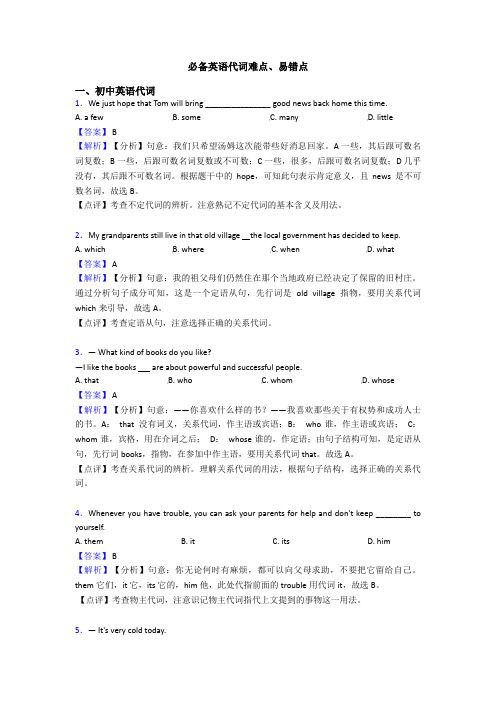
必备英语代词难点、易错点一、初中英语代词1.We just hope that Tom will bring _______________ good news back home this time. A. a few B. some C. many D. little【答案】 B【解析】【分析】句意:我们只希望汤姆这次能带些好消息回家。
A 一些,其后跟可数名词复数;B 一些,后跟可数名词复数或不可数;C 一些,很多,后跟可数名词复数;D 几乎没有,其后跟不可数名词。
根据题干中的hope,可知此句表示肯定意义,且news是不可数名词,故选B。
【点评】考查不定代词的辨析。
注意熟记不定代词的基本含义及用法。
2.My grandparents still live in that old village the local government has decided to keep.A. whichB. whereC. whenD. what【答案】 A【解析】【分析】句意:我的祖父母们仍然住在那个当地政府已经决定了保留的旧村庄。
通过分析句子成分可知,这是一个定语从句,先行词是old village指物,要用关系代词which来引导,故选A。
【点评】考查定语从句,注意选择正确的关系代词。
3.— What kind of books do you like?—I like the books are about powerful and successful people.A. thatB. whoC. whomD. whose【答案】 A【解析】【分析】句意:——你喜欢什么样的书?——我喜欢那些关于有权势和成功人士的书。
A:that 没有词义,关系代词,作主语或宾语;B:who谁,作主语或宾语;C:whom谁,宾格,用在介词之后;D:whose谁的,作定语;由句子结构可知,是定语从句,先行词books,指物,在参加中作主语,要用关系代词that。
高考英语 代词中的两大重点和两大难点
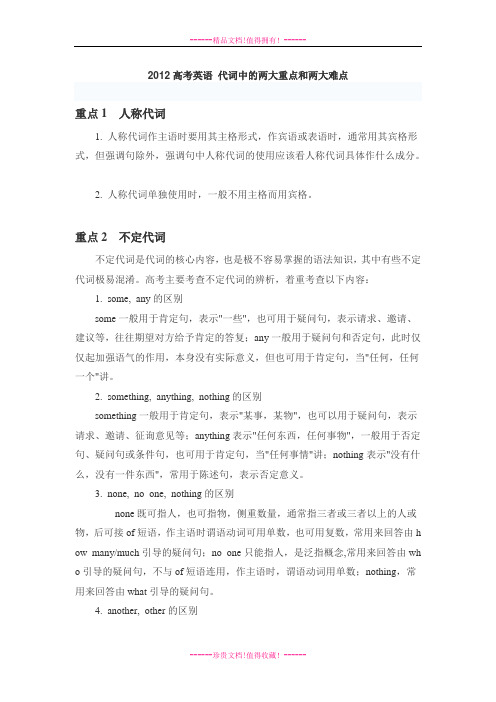
2012高考英语代词中的两大重点和两大难点重点1 人称代词1. 人称代词作主语时要用其主格形式,作宾语或表语时,通常用其宾格形式,但强调句除外,强调句中人称代词的使用应该看人称代词具体作什么成分。
2. 人称代词单独使用时,一般不用主格而用宾格。
重点2 不定代词不定代词是代词的核心内容,也是极不容易掌握的语法知识,其中有些不定代词极易混淆。
高考主要考查不定代词的辨析,着重考查以下内容:1. some, any的区别some一般用于肯定句,表示"一些",也可用于疑问句,表示请求、邀请、建议等,往往期望对方给予肯定的答复;any一般用于疑问句和否定句,此时仅仅起加强语气的作用,本身没有实际意义,但也可用于肯定句,当"任何,任何一个"讲。
2. something, anything, nothing的区别something一般用于肯定句,表示"某事,某物",也可以用于疑问句,表示请求、邀请、征询意见等;anything表示"任何东西,任何事物",一般用于否定句、疑问句或条件句,也可用于肯定句,当"任何事情"讲;nothing表示"没有什么,没有一件东西",常用于陈述句,表示否定意义。
3. none, no one, nothing的区别none既可指人,也可指物,侧重数量,通常指三者或三者以上的人或物,后可接of短语,作主语时谓语动词可用单数,也可用复数,常用来回答由h ow many/much引导的疑问句;no one只能指人,是泛指概念,常用来回答由wh o引导的疑问句,不与of短语连用,作主语时,谓语动词用单数;nothing,常用来回答由what引导的疑问句。
4. another, other的区别another泛指同类事物中的三者或三者以上的"另一个",只能代替或修饰单数可数名词。
(完整版)代词知识点总结
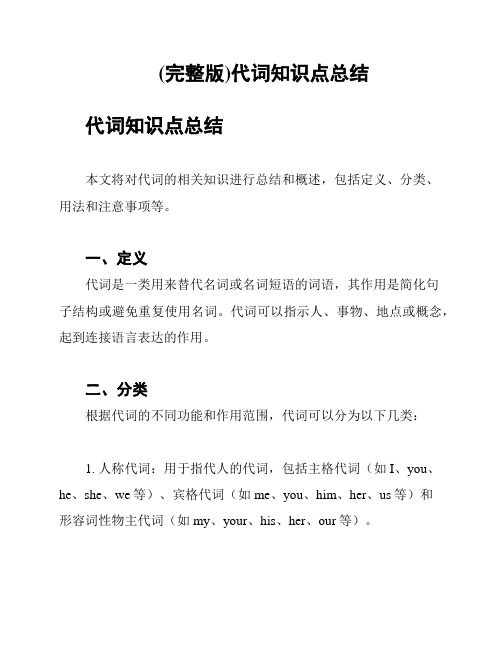
(完整版)代词知识点总结代词知识点总结本文将对代词的相关知识进行总结和概述,包括定义、分类、用法和注意事项等。
一、定义代词是一类用来替代名词或名词短语的词语,其作用是简化句子结构或避免重复使用名词。
代词可以指示人、事物、地点或概念,起到连接语言表达的作用。
二、分类根据代词的不同功能和作用范围,代词可以分为以下几类:1. 人称代词:用于指代人的代词,包括主格代词(如I、you、he、she、we等)、宾格代词(如me、you、him、her、us等)和形容词性物主代词(如my、your、his、her、our等)。
2. 物主代词:用于指代和表示所属关系的代词,包括形容词性物主代词(如my、your、his、her、our等)和名词性物主代词(如mine、yours、his、hers、ours等)。
3. 指示代词:用于指示人或事物的代词,包括近指示代词(如this、these)和远指示代词(如that、those)。
4. 疑问代词:用于提问的代词,包括“谁”、“什么”、“哪一个”等,如who、what、which、whose等。
5. 相对代词:用于引导定语从句的代词,如that、which、who 等。
6. 不定代词:用于泛指或不确定指代的代词,如somebody、anybody、something、anything等。
三、用法代词的用法主要包括以下几种:1. 代替主格代词作为主语:- 例如:He is a teacher. → He likes his job. → It is a great job.He likes his job. → It is a great job.2. 代替宾格代词作为宾语:- 例如:She loves you. → She loves you very much. → She loves you very much.you very much. → She loves you very much.3. 代替名词作为宾语补足语:- 例如:I find the article interesting. → I find it interesting.it interesting.4. 代替名词作为同位语:- 例如:The fact is undeniable. → This is undeniable.This is undeniable.5. 代替名词作为定语:- 例如:I lost my phone. → My phone is lost.My phone is lost.6. 表示非特定指代或泛指:- 例如:Somebody called you. → They didn't leave amessage.They didn't leave a message.7. 表示指示或引导注意:- 例如:This is the book I mentioned. → This is the book.This is the book.四、注意事项在使用代词时,需要注意以下几点:1. 确保代词与所指代的名词或名词短语在人称、数和格等方面保持一致。
初高中英语语法一体化重难点复习(代词讲义)

I want that.(宾语) My book is that.(表语) I like that dress.(定语) 注意: 1. 为避免重复,可用 that 和 those 代替前面提到的名词。如: The playground of this school is bigger than that of that school. (That=the playground) My seat is next to that of the mayor.(that=mayor’s seat) 我的座位在市长座位旁边。 2. 用来回指上文提到的事情时,可用 this 或 that,但是若要指下文叙述的事情,通常要用 this。如: ——She is a beautiful girl. ——Who said that? I want to know this: Is she beautiful? 我想知道这一点:她美吗? 3. 在打电话时,通常用 this 指自己,用 that 指对方: Hello. This is Jim. Is that John? 喂,我是吉姆,你是约翰吗? 4.除用作代词外,this 和 that 还可用作副词,用以修饰形容词或副词,意为“这么”、“那么”,相当于 so。 如: I've done only that much. 我所做的就这么多。 Is he always this busy? 他总这么忙吗? 5.指示代词 this, that 和 these 在作主语时可指物也可指人,但作其他句子成分时只能指物,不能指人。而 those 作宾语后接定语从句时可以指人。而且只有 that、those 后面可以跟定语从句。 如:(对)That is my teacher. 那是我的老师。(that 作主语,指人)
九年级英语 代词难点汇总
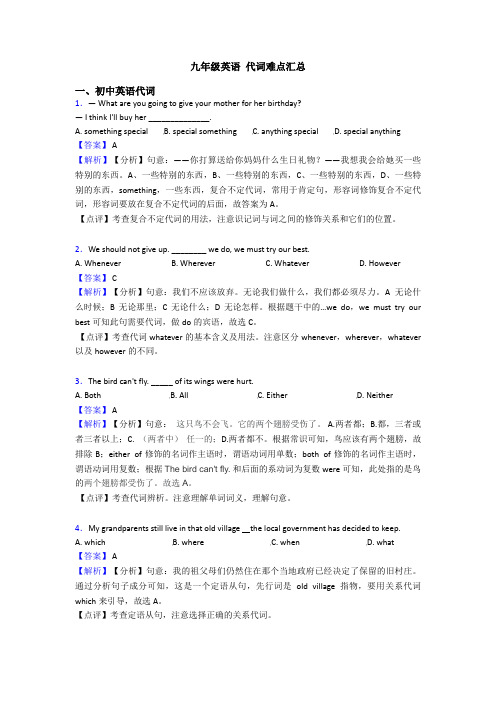
九年级英语代词难点汇总一、初中英语代词1.— What are you going to give your mother for her birthday?— I think I'll buy her ______________.A. something specialB. special somethingC. anything specialD. special anything【答案】 A【解析】【分析】句意:——你打算送给你妈妈什么生日礼物?——我想我会给她买一些特别的东西。
A、一些特别的东西,B、一些特别的东西,C、一些特别的东西,D、一些特别的东西,something,一些东西,复合不定代词,常用于肯定句,形容词修饰复合不定代词,形容词要放在复合不定代词的后面,故答案为A。
【点评】考查复合不定代词的用法,注意识记词与词之间的修饰关系和它们的位置。
2.We should not give up. ________ we do, we must try our best.A. WheneverB. WhereverC. WhateverD. However【答案】 C【解析】【分析】句意:我们不应该放弃。
无论我们做什么,我们都必须尽力。
A 无论什么时候;B 无论那里;C 无论什么;D 无论怎样。
根据题干中的…we do,we must try our best可知此句需要代词,做do的宾语,故选C。
【点评】考查代词whatever的基本含义及用法。
注意区分whenever,wherever,whatever 以及however的不同。
3.The bird can't fly. _____ of its wings were hurt.A. BothB. AllC. EitherD. Neither【答案】 A【解析】【分析】句意:这只鸟不会飞。
它的两个翅膀受伤了。
A.两者都;B.都,三者或者三者以上;C. (两者中)任一的;D.两者都不。
重难点突破04 代词(解析版)(通用版)
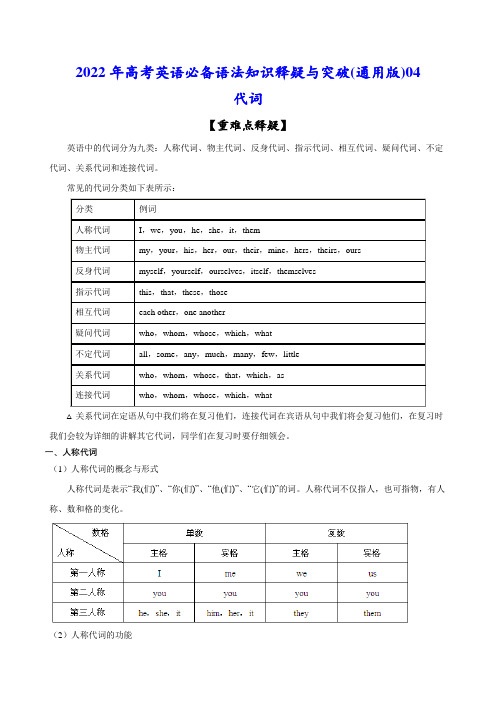
2022年高考英语必备语法知识释疑与突破(通用版)04代词【重难点释疑】英语中的代词分为九类:人称代词、物主代词、反身代词、指示代词、相互代词、疑问代词、不定代词、关系代词和连接代词。
常见的代词分类如下表所示:分类例词人称代词I,we,you,he,she,it,them物主代词my,your,his,her,our,their,mine,hers,theirs,ours反身代词myself,yourself,ourselves,itself,themselves指示代词this,that,these,those相互代词each other,one another疑问代词who,whom,whose,which,what不定代词all,some,any,much,many,few,little关系代词who,whom,whose,that,which,as连接代词who,whom,whose,which,what△关系代词在定语从句中我们将在复习他们,连接代词在宾语从句中我们将会复习他们,在复习时我们会较为详细的讲解其它代词,同学们在复习时要仔细领会。
一、人称代词(1)人称代词的概念与形式人称代词是表示“我(们)”、“你(们)”、“他(们)”、“它(们)”的词。
人称代词不仅指人,也可指物,有人称、数和格的变化。
(2)人称代词的功能人称代词有主格和宾格之分,主格形式在句中作主语、表语等成分,宾格形式在句中作动词宾语、介词宾语、同位语等,有时也作表语。
e.g.Alice will be graduated pretty soon. She will find a job in another city.爱丽斯马上就要毕业了,她将在另一个城市找一份工作。
(she作主语)I love climbing. It keeps me fit.我喜欢爬山,它使我保持健康。
(it作主语)—Who took away all the books here?谁把这里的书都拿走了?—It’s I/me.是我。
2024中考英语重难点专练重难点03 易混代词辨析
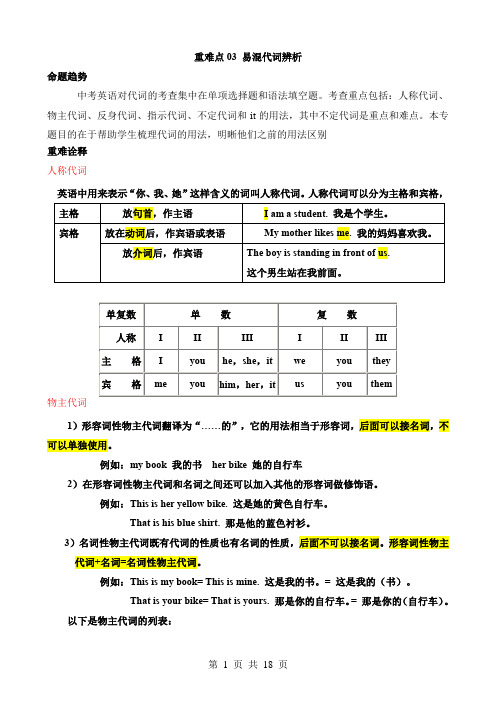
重难点03 易混代词辨析命题趋势中考英语对代词的考查集中在单项选择题和语法填空题。
考查重点包括:人称代词、物主代词、反身代词、指示代词、不定代词和it的用法,其中不定代词是重点和难点。
本专题目的在于帮助学生梳理代词的用法,明晰他们之前的用法区别重难诠释人称代词英语中用来表示“你、我、她”这样含义的词叫人称代词。
人称代词可以分为主格和宾格,物主代词1)形容词性物主代词翻译为“……的”,它的用法相当于形容词,后面可以接名词,不可以单独使用。
例如:my book 我的书her bike 她的自行车2)在形容词性物主代词和名词之间还可以加入其他的形容词做修饰语。
例如:This is her yellow bike. 这是她的黄色自行车。
That is his blue shirt. 那是他的蓝色衬衫。
3)名词性物主代词既有代词的性质也有名词的性质,后面不可以接名词。
形容词性物主代词+名词=名词性物主代词。
例如:This is my book= This is mine. 这是我的书。
= 这是我的(书)。
That is your bike= That is yours. 那是你的自行车。
= 那是你的(自行车)。
以下是物主代词的列表:英语中共有八个反身代词,在使用时应注意和它所指的相应的对象在人称、性别、数上保持一致。
其基本形式如下表所示:用法详解:反身代词有三种不同的用法:一、强调用法反身代词在强调用法中表示强调,即用来加强某个名词或者代词的语气,可译成“亲自”、“本人”。
此时,它在句中作同位语。
即使去掉,也不影响句子的完整性。
例如:(1)You must do it yourself.(你必须自己做)(2)I myself did the homework last night。
(昨晚是我自己做了家庭作业)二、非强调用法这种用法通常表示反身代词与句中的主语是同一人。
它在句中作宾语,不能省略,否则该句是一个意义不完整的错句。
- 1、下载文档前请自行甄别文档内容的完整性,平台不提供额外的编辑、内容补充、找答案等附加服务。
- 2、"仅部分预览"的文档,不可在线预览部分如存在完整性等问题,可反馈申请退款(可完整预览的文档不适用该条件!)。
- 3、如文档侵犯您的权益,请联系客服反馈,我们会尽快为您处理(人工客服工作时间:9:00-18:30)。
代词难点一点通no adj. & adv.△ No the teachers went on strike.×There are no any students in the classroom. ×1.修饰可数名词单数时,no = not aI have no friends. = I don’t have a friend.There’s no bus. = There’s not a bus.2. 修饰可数名词复数和不可数名词时,no = not anyTher e are no people in the room. = There aren’t any people in the room.I have no time. = I have not any time.There is no water in the glass. = There isn’t any water in the glass.3. no修饰名词时,这个名词前不能有冠词 (a / the)、物主代词(my / your…)、指示代词(this / that) 或all / every,如果有,要改为none of…。
none of = not any ofNone of my friends came to the party. = Not any of my friends came to the party. No teachers went out. (不说No the teachers went out.)none 指人或指物, 其后常接of短语。
none of + 复数名词(或代词),其后的动词单复均可。
none of + 物质名词或抽象概念,其后的动词要用单数。
None of them have / has seen him.None of this money belongs to me.None of her relations are / is interested.none 还可以单独使用,如:“Is there any coal left?”“No, none at all.”“How many students are there in the classroom?”“None.”“How many of the books have you read?”“None at all.”“How much water left is there in the bottle?”“None.”比较:No one thinks he is clever. (= Nobody thinks he is clever.) No one knows what they fought about.No one likes a person with bad manners.“Who are you speaking to?”“No one.” (or: Nobody)“Who(m) did you see enter the lonely house?”“Nobody.” (or: No one)△ No one of us attended the meeting. ×I’ve read no one of his books.×1. none 用来指人或物;no one (= nobody) 主要用来指人 (= not even one 意为:连一个也没有,语气重)。
2. none常接of 短语;no one 不能接of 短语。
3. 作主语时,none 后面的名词为复数时,动词可用单数或复数;no one 只用作单数,动词也用单数。
4. none 往往用在一定的范围内;no one 没有范围限制。
5. 回答who引导的问句用no one或nobody;回答how many或how much引导的问句用none。
6. 当谈到两个人或事时,不用no 或none,而用 neither。
much / many△John’s got many friends because he’s got much money.Tom talks much.1.much 修饰不可数名词,many 修饰可数名词,它们多用在否定句或疑问句中;在肯定句中多用a lot of, lots of, plenty of,如:Are there many people in the street? (改用any意思不同)Tom hasn’t many books. (改用any意思不同)He doesn’t know much English.Did you have much trouble with the customs?2.many 和many 在较为正式的文体中可以用在肯定句中,特别是在句首时,如:Many machines at the exhibition are made in China.Much steel has been saved.3.在肯定句中,在too, so, as之后,以及在某些含有very的词语中,常用many和much,这是正常的,如:Tom talks too much.There’s so much violence these days.Try to get as many opinions as you can.You’ve bought too many tomatoes.4.在由whether / if 引导的从句中,要用many或much。
They doubt whether he has much knowledge on that subject.few / a fewTom has a few friends besides you. (作定语)Tom has a few friends besides you.Few of them are any good. (作主语)A few of them are good.I know few of these people. (作宾语)I know few of these people.1. few修饰可数名词复数。
2. few (= not many; hardly any)含否定意义;a few (= some; several; a small number of) 含肯定意义。
3. not a few = no few = quite a few = a good few = many。
4.当 few受 every, last, past, next, some, very等词所修饰时,表示肯定意义,few 之前不再有冠词。
如:In the last few minutes, he checked up his paper again.It took us some few days to repair the machine.They are very few in number.There were too few of them.He goes to see his grandma every few weeks.5.在非正式文体中很少见,一般用或代替,如:Only a few people attended the meeting.little / a littleLittle remains to be done about it. (作主语)A little remains to be done.Please give me a little. (作宾语)He knows a little of everything.There is very / but little time left. (作定语)Don’t worry; you still have a little time.1. little修饰不可数名词,表示“量”。
2. little含否定意义(反义词:much);a little含肯定意义(反义词:none)。
3.在非正式英语中,一般很少用little,常用not much, only a little来代替,如:We haven’t got much money / time.each1.each作为限定词用(作定语),后接单数可数名词,如:Each day is better than the one before.There is a line of trees on each side of the street.注:可以说:each sister, my sister(s),但不可以说:each my sister。
2.当名词前有另一个限定词(冠词、物主代词、指示代词)时,要用each of,(这时的each 是代词)后接复数名词,如:Each of my aunts gave me socks for Christmas.I’ve invited each of the students in turn.注:名词前没有其他限定词不用each of,所以不能说:Each of aunts…。
3.each作为代词,也可以用在人称代词前,这时须加of,作主语时动词要用单数,如:Each of them / us had a try.Each of them is broken. (cf. Each of the cups is broken.)Each of them has his own duty.4.each本身可以独立用作代词,后面不接名词,不用of,作主语时动词要用单数,如:Each has his merits.I had some crazy dreams last night. Each was funnier than the last.注:在这种情况下,以用each one为宜,显得更自然:Each one was perfect.Each one was funnier than the last.5.each可以跟在主语之后作同位语,这时主语和动词均为复数,如:We each have our own attitude to bringing up children.The boys each have a new bike.注:动词为 be或有助动词时,each应放在其后。
His sisters have each married businessmen.The witnesses were each perfectly certain of what they said.6.each还可以放在间接宾语之后,但一般不用在直接宾语的后面,如:She sent the children / them each a present.不说:She kisses them each.7.each还可以作副词,如:Give them two books each. (= Give each of them two books.)The students have ten books each.each / every1.each从个体着眼,强调“每个”人或物的个别情况,表示“各个”;every从整体着眼,强调共同性,意为“个个都”(= all),但有时在句中使用时并无太大的区别,如:You look more beautiful every / each time I see you.I know every / each member of the family.Each / Every man carried a box on his shoulder.2.each用于两者或两者以上;every用于三者或三者以上。
